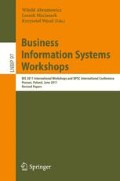Abstract
An expert epistemology is a theory about knowledge in the expertise and includes knowledge representation, semantics, specifications, heuristics, reasoning, etc. Superexpert systems employ computer capabilities to extend ordinary human abilities, and are derived from expert epistemologies. A superexpert system, Negotiation Game or NeGame (NeG), is designed to support the Harvard Principled Negotiation model; it is illustrated by a Civilisation application which reframes the Israel-Palestine conflict as the task of negotiating a mutually acceptable civilisation. The negotiation epistemology of NeG evolved from the adversarial epistemology of eGanges (eG); both handle tasks in a user-friendly and transparent way. NeG manages hierarchical complexity of the conflict issues and differences in their subjective values, advises on cumulative scoring of Wins and Losses, and, through mathematical techniques, maximises Win-Win options. Adversarial epistemology requires four-valued logic, whereas negotiation epistemology requires six-valued logic; they share a common knowledge hierarchy, called a River.
Access this chapter
Tax calculation will be finalised at checkout
Purchases are for personal use only
Preview
Unable to display preview. Download preview PDF.
References
Gray, P.: Legal Knowledge Engineering Methodology for Large Scale Expert Systems, Volumes 1 and 2, PhD thesis, University of Western Sydney (2007), http://trove.nla.gov.au/work/3901700
Gray, P., Gray, X.: A map-based expert-friendly shell. In: Bourcier, D. (ed.) Legal Knowledge and Information Systems. IOS Press, Amsterdam (2003)
Fraunce, A.: The lawyer’s logic, Reproduced from the original manuscript in the British Museum, Lawiers Logike, first published by William How, London, The Scolar Press Limited, Menston, Yorkshire, England (originally published 1588, 1969)
Gray, P.N., Mann, S.: The Fraunce (1588) model of case-based reasoning. In: Proceedings of 9th International Conference on Artificial Intelligence and Law. ACM, New York (2003)
Ong, W.J.: Ramus method and the decay of dialogue. Harvard University Press, Cambridge (1958)
Fisher, R., Ertel, D.: Getting Ready to Negotiate. Penguin, New York (1995)
Fisher, R., Ury, W., Patton, B.: Getting to Yes. Random Century, London (1991)
Spencer, D.: Essential Dispute Resolution, Cavendish Australia, Sydney (2005)
Mayer, B.: The Dynamics of Conflict Resolution. Jossey-Bass, San Francisco (2000)
Zeleznikow, J., Bellucci, E.: Classifying Online Dispute Resolution by comparing family mediation and the Israel – Palestinian conflict. In: Proceedings of 13th International Conference on Artificial Intelligence and Law. ACM, New York (2011)
Gray, P., Gray, X.: Quality Controlled Government with Spherical Logic. Int. J. Interdisciplinary Soc. Sci. 5(10), 271–284 (2011), http://iji.cgpublisher.com/product/pub.88/prod.1305
Menkel-Meadow, C.: Toward another view of legal negotiation: the structure of problem solving. University of California Law Review 31, 755 (1984)
Ishikawa, K.: What is total quality control? The Japanese way, translated by David J. Lu. Prentice-Hall Inc., Englewood Cliffs (1985)
Blyth, T.S.: Lattices and Ordered Algebraic Structures. Springer, San Francisco (2005)
Lukasiewicz: O logice trojwartosciowej (On three-valued logic). Ruch filozoficzny 5, 170–171 (1920)
Kleene, S.C.: Introduction to Metamathematics. North Holland, Amsterdam (1952)
Belnap, N.: How a computer should think. In: Ryle, G. (ed.) Contemporary Aspects of Philosophy, pp. 30–55. Oriel Press, Stocksfield (1976)
Ginsberg, M.L.: Multivalued logics: A uniform approach to inference in artificial intelligence. Computational Intelligence 4(3), 256–316 (1992)
Fitting, M.: Many-valued non-monotonic modal logics. In: Nerode, A., Taitslin, M.A. (eds.) LFCS 1992. LNCS, vol. 620, pp. 139–150. Springer, Heidelberg (1992)
Majkić, Z.: Ontological encapsulation of many-valued logic. In: Proceedings of Convegno Italiano di Logica Computazionale (2004), http://www.cs.unipr.it/CILC04/DownloadArea/Majkic-CILC04.pdf
Author information
Authors and Affiliations
Editor information
Editors and Affiliations
Rights and permissions
Copyright information
© 2011 Springer-Verlag Berlin Heidelberg
About this paper
Cite this paper
Gray, X., Gray, P.N., Zeleznikow, J. (2011). Supporting the Harvard Model of Principled Negotiation with Superexpertise. In: Abramowicz, W., Maciaszek, L., Węcel, K. (eds) Business Information Systems Workshops. BIS 2011. Lecture Notes in Business Information Processing, vol 97. Springer, Berlin, Heidelberg. https://doi.org/10.1007/978-3-642-25370-6_29
Download citation
DOI: https://doi.org/10.1007/978-3-642-25370-6_29
Publisher Name: Springer, Berlin, Heidelberg
Print ISBN: 978-3-642-25369-0
Online ISBN: 978-3-642-25370-6
eBook Packages: Computer ScienceComputer Science (R0)

